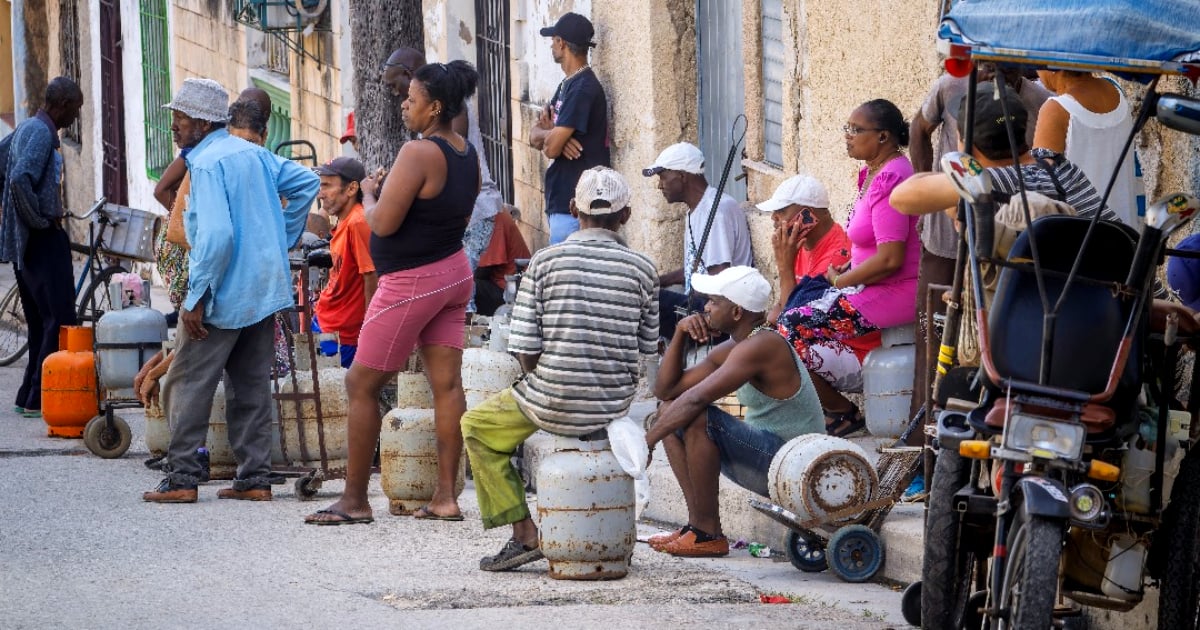
Related videos:
The crisis of liquefied gas in Cuba has reached alarming levels, directly impacting the daily lives of thousands of families who rely on this fuel for cooking.
For months, citizens have been facing long lines, uncertainty, and frustration due to the lack of supply. Social media and local outlets portray a reality that many describe as unsustainable: "We are going back to using firewood," they assert with a mix of indignation and resignation.
"This is an Odyssey!... Because in Cuba, many things may be lacking, but one thing that will never be missing is the disrespect towards the Cuban people. This is how the gas station in the Alex Urquiola neighborhood wakes up every Saturday for more than 5 months, because as always, 'There is no gas.' And when, miraculously, the cylinders finally arrive, there are so few that they barely meet a fraction of the demand," complained a Cuban social media user.
His complaint, published in the Facebook group 'Revolico Holguín. Potatoes are not sold here', was accompanied by a photograph showing a crowd of customers waiting for the sale of liquefied gas canisters in the mentioned neighborhood.
Cubans forced to cook with firewood due to gas shortages
The shortage of liquefied gas in Cuba has forced numerous families to revert to traditional methods for preparing their food. The lack of supply has led to extreme situations, such as that of a mother of triplets in Santiago de Cuba, who reported in October 2022 having to cook with firewood due to the absence of gas and kerosene.
In Havana, a family was forced in August 2023 to light wood fires in the middle of the street, near the Train Terminal, reflecting the desperation caused by the lack of fuel for cooking.
The situation is worsening in provinces like Granma, where authorities distributed firewood to the population in October due to the shortage of charcoal and gas, highlighting the severity of the energy crisis the country is experiencing.
A problem that is worsening since 2024
The shortage of liquefied gas is not a recent phenomenon in Cuba, but since October 2024, the situation has significantly worsened, peaking critically in December.
According to official data, provinces such as Matanzas have been particularly affected. More than 109,000 liquefied gas customers in this region are facing irregular supply, while local officials acknowledge that demand far exceeds the current distribution capacity.
Authorities have tried to prioritize delivery to those who have gone the longest without supplies, but this measure barely alleviates the frustration of a population that relies on gas for basic tasks.
The director of the Territorial Division of Fuel Marketing (DTCC) in Matanzas, José Luis Lemus Gil, recently admitted to the state-run newspaper Girón that there are no short-term prospects for improvement, as the shortage of cylinders and transportation issues are worsening the situation.
Insufficient official measures
In light of this situation, initiatives such as the app "Mi Turno" have been implemented to digitalize and organize virtual queues for gas purchases. However, this solution does not address the root problem: the lack of product availability.
In provinces like Holguín, where morning lines have been a constant for the past five months, citizens report that when the cylinders arrive, they do not even meet a fraction of the demand.
Another failed attempt to alleviate the crisis was the virtual store, which allowed customers to place gas orders through the EnZona platform. This service was suspended due to a shortage of cylinders and a deficit of the product.
The interruption of messenger activity, responsible for delivering orders to vulnerable individuals, has been another blow to the most affected sectors, such as the elderly or people with disabilities.
Impact on the population and household economy
The shortage of liquefied gas has forced many families to resort to practices that were once considered outdated, such as using firewood for cooking, as reported by Girón under the headline "In the absence of gas... firewood to the fire."
This return to the past not only symbolizes a setback in terms of quality of life but also creates new challenges, from health issues due to smoke exposure to a significant environmental impact in rural areas where firewood is collected.
Moreover, the situation has an indirect effect on electricity consumption. Without gas, many families rely solely on electric appliances for cooking, which increases the demand for electricity in a country already impacted by an unstable energy system.
The informal market and institutional silence
The gas shortage has also boosted informal market activities, where gas cylinders can reach exorbitant prices, exceeding 100 USD, and rising to 150 USD if the sale includes the contract.
This reality contrasts with the official cost of about 6.96 USD per cylinder, according to data from the Ministry of Energy and Mines. In this context, social media has become a space to express public discontent, highlighting the silence of the institutions responsible for gas distribution.
Meanwhile, the lack of transparent information fuels rumors and speculation. Delays in the arrival of ships with gas and irregularities detected at sales points only serve to exacerbate citizens' distrust towards the authorities.
An uncertain future
Despite local efforts to address the crisis, the prospects for a short-term solution are bleak.
The shortage of cylinders, transportation issues, and the inability to meet demand remain insurmountable barriers today. Meanwhile, thousands of Cubans continue to adapt to a precarious reality, where obtaining a gas cylinder has become a privilege.
The liquefied gas crisis in Cuba reflects the multiple economic and social challenges the country is facing. For most, the endless waiting and insufficient solutions have become the norm, while firewood continues to burn on stoves and in the indignation of a people weary of surviving in extreme conditions.
Filed under: